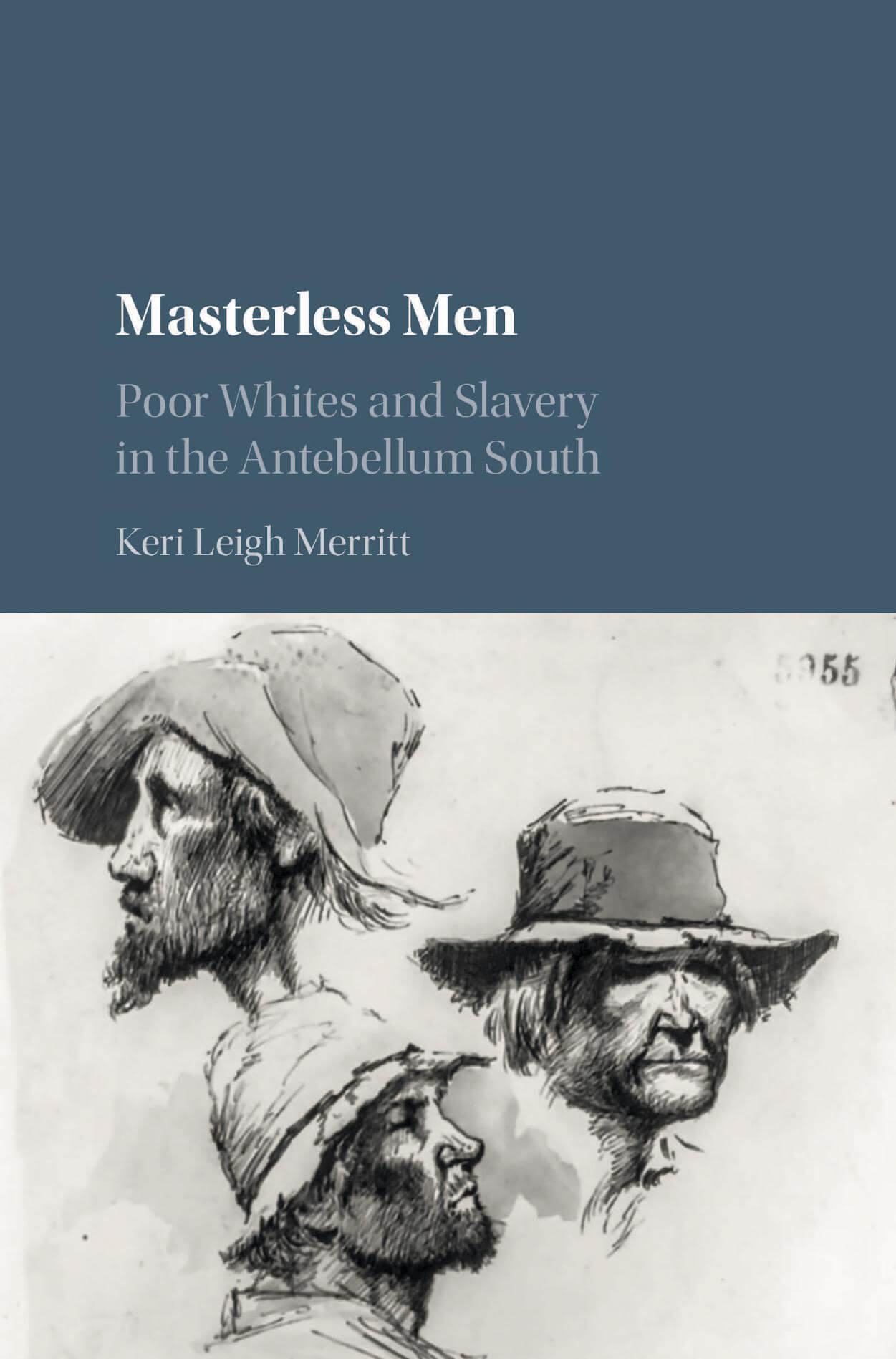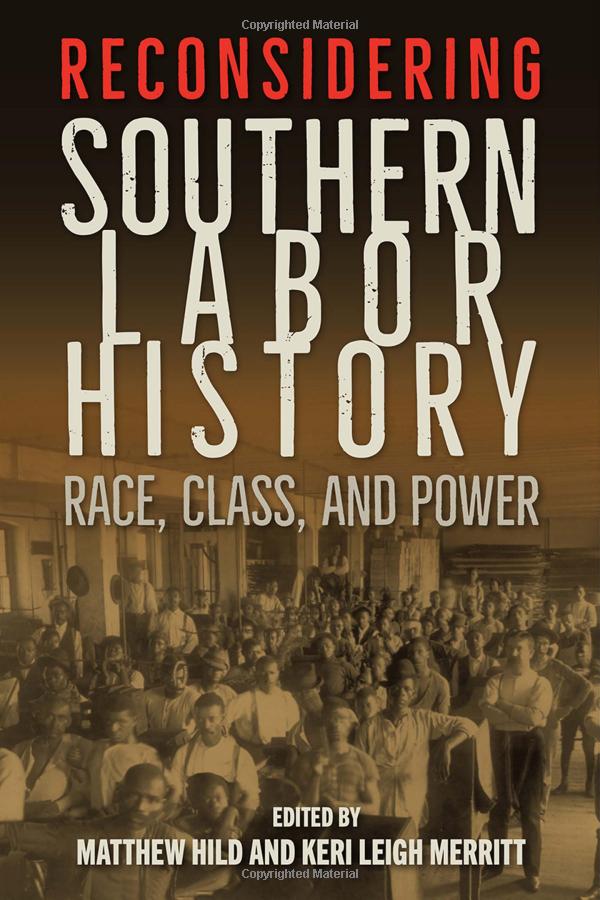BOOKS
Masterless Men: Poor Whites and Slavery in the Antebellum South (Cambridge Studies on the American South)
Publisher: Cambridge University Press (May 8, 2017)
Analyzing land policy, labor, and legal history, Keri Leigh Merritt reveals what happens to excess workers when a capitalist system is predicated on slave labor. With the rising global demand for cotton – and thus, slaves – in the 1840s and 1850s, the need for white laborers in the American South was drastically reduced, creating a large underclass who were unemployed or underemployed. These poor whites could not compete – for jobs or living wages – with profitable slave labor. Though impoverished whites were never subjected to the daily violence and degrading humiliations of racial slavery, they did suffer tangible socio-economic consequences as a result of living in a slave society. Merritt examines how these ‘masterless’ men and women threatened the existing Southern hierarchy and ultimately helped push Southern slaveholders toward secession and civil war.
Awards:
- Winner of the 2018 Bennett H. Wall Award, from the Southern Historical Association, for the best book published in the previous two years on southern business or economic history.
- Winner of the 2018 President’s Book Award, from the Social Science History Association, awarded annually to a first work by an early-career scholar.
Praise for Masterless Men
In Masterless Men, Keri Leigh Merritt offers a sweeping analysis of how we should understand the place of poor whites in the larger narrative of the Old South. Her detailed examination of the Deep South’s impoverished white class will deepen our understanding about the human and economic costs of America’s system of black slavery.
– Charles Bolton, author of William F. Winter and the New Mississippi
Merritt moves class front and center as she documents the brutal, unfair realities of life for poor whites struggling to survive in a society structured against them. Her work holds tremendous implications for our understanding of social relations, the economy, politics, and the law in the Old South.
– Jeff Forret, author of Williams’ Gang: A Notorious Slave Trader and his Cargo of Black Convicts
Keri Leigh Merritt reveals the parallel roots of white poverty and slavery in the antebellum South. With precision and conviction, she demonstrates that landlessness, low wages, and illiteracy, accompanied by legal and extra-legal harassment by the state, were not mere by-products of slavery, but the result of policies that enriched slaveholders while muting dissent by poor whites.
– Victoria Bynum, author of The Free State of Jones: Mississippi’s Longest Civil War
… the lesson to be drawn from Merritt’s magnificent work is that the problem of justice requires enormous bridge-building exercises if we wish to level the playing field without worsening other forms of inequality. History shows us the limits of ideological progress, but also reveals opportunities that can be seized, if only we can muster the courage and the know-how.
– Robert L. Tsai, author of Practical Inequality, Forging Justice in a Divided Nation
Reconsidering Southern Labor History: Race, Class, and Power
Publisher: University Press of Florida (July 10, 2018)
The American Dream of reaching success through sheer sweat and determination rings false for countless members of the working classes. This volume shows that many of the difficulties facing workers today have deep roots in the history of the exploitation of labor in the South. Contributors make the case that the problems that have long beset southern labor, including the legacy of slavery, low wages, lack of collective bargaining rights, and repression of organized unions, have become the problems of workers across the country.
Spanning nearly all of U.S. history, the essays in this collection range from West Virginia to Florida to Texas. They examine vagrancy laws in the early republic, inmate labor at state penitentiaries, mine workers and union membership, and strikes and the often-violent strikebreaking that followed. They also look at pesticide exposure among farmworkers, labor activism during the civil rights movement, and foreign-owned auto factories in the rural South. They distinguish between different struggles experienced by women and men, as well as by African American, Latino, and white workers.
The broad chronological sweep and comprehensive nature of Reconsidering Southern Labor History set this volume apart from any other collection on the topic in the past forty years. Presenting the latest trends in the study of the working-class South by a new generation of scholars, this volume is a surprising revelation of the historical forces behind the labor inequalities inherent today.
Awards:
- Winner of the 2019 Best Book Award from the UALE (United Association for Labor Education)
Praise for Reconsidering Southern Labor History
This is an exceptional collection of essays on Southern labor from first-rate scholars in the field. Essays range from early workers’ movements in the nineteenth century and the origins of prison labor in the South to recent history of automation and how Southern industries are the future of labor in America–cheap and unprotected. The essays are quite even in quality and depth, some focusing on a court decision in context, a strike, or a broader sweep of scholarship. Matthew Hilda and Keri Leigh Merritt have edited a groundbreaking volume that belongs in every research library’s stacks of each Southern labor scholar’s shelf.
– Calvin Schermerhorn, author of Unrequited Toil: A History of United States Slavery
This collection impresses with its chronological sweep, diverse subject matter, and fresh perspectives on southern labor history. It not only affirms the relevance of the southern working-class experience but also enhances our understanding of the broader contours of labor and working-class history.
– Robert Bussel, author of Fighting for Total Person Unionism: Harold Gibbons, Ernest Calloway, and Working-Class Citizenship
An outstanding collection of essays that promises to help solve America’s labor history illiteracy problem and that offers much to learn about the history of capitalism, management, labor, and the struggles of ordinary people in the South.

